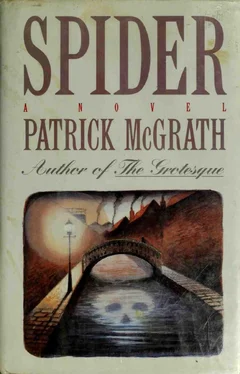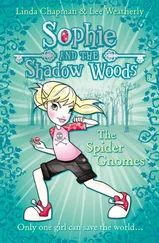He turned. She was standing in the doorway of her bedroom. She was wearing a dressing gown of some silky material, low-cut at the breast and tightly belted. Her hair was freshly brushed, and she was smoking a cigarette. Without her high heels she was an inch or two shorter than my father, and this fact alone provoked in him a vivid flare of the familiar heat. “Afternoon,” he said, standing stiffly in front of her with his toolbag in one hand and his cap in the other. She was leaning against the doorframe; her room, my father saw, was crowded with furniture. The bed, unmade, was huge, the headboard a dark plate of lacquered wood wedged between two stout posts with knobs at the top. At the foot of the bed stood a dressing table, a mere splinter of space separating it from the bed, its big mirror and two flanking wings almost obliterating the window, which was curtained with a piece of dingy lace, and through which he glimpsed the vast looming bulk of the gasworks; and upon the dressing table a chaotic litter of cosmetics and hairbrushes and pins and grips and bits of colored elastic. Between bed and wall on one side was a small table, also littered with female stuff, and from the depths of that litter rose a half-empty bottle of port and a pair of unwashed glasses. On the other side of the bed was a chair, so heavily draped with skirts and blouses and stockings and underwear that it was more a hump of fabrics, a hillock of silk and cotton, than anything else. Then the banging started: suddenly, a series of harsh metallic clangs in the pipes. “Hear that?” said Hilda. “We get that three times an hour.”
“Water-hammer,” said my father in his short gruff way.
Hilda shifted slightly on her doorframe and blew smoke at the ceiling. “That what you call it?” she said.
My father nodded. “Blockage in the vent stack, I shouldn’t wonder.”
She gazed at him frankly. “It’s driving me mad,” she said. “Can you fix it, plumber?”
My father sniffed, adopted his cagey artisan manner, as if to suggest that this was a matter of delicacy and tact. “I’ll have to test the system,” he said.
“Live round here, do you?” said Hilda.
“Kitchener Street.”
“I thought so.” She was examining her fingernails. “I thought I seen you down the Dog.” Suddenly she yawned, stretched her arms above her head and then, with a lazy smile, folded them back across her chest. “You going to stand there all day, then?” she said. “I thought you was here to do my pipes.”
Her skin, my father noticed, was a much paler pink than he’d first thought, white, almost, and her dressing gown left exposed all the top part of her bosom. He also realized for the first time that her chin was really quite abnormally prominent, but her skin was so clear, and her hair so gloriously wheaty (though black at the roots), that after a moment or two you simply didn’t notice the square, puggy jut of the thing, and the bad bite of her ill-occluding lower teeth. “Some sort of clogging,” said my father, still standing in the doorway, still with his cap in one hand and his toolbag in the other. Then, as Hilda bent down to scoop up the cat purring at her ankles, he saw them: a glimpse, a clear view, for just an instant, as the dressing gown fell forward, of her breasts: perfectly framed within the silky material, a pair of white, bell-shaped breasts with little rose-colored nipples. He tore his eyes away. “Air in the pipes,” he said—and at that moment, as suddenly as it had begun, the banging stopped.
“Bad air,” said Hilda, absently stroking the cat. “Can’t you smell it?”
“It’s coming from your lavatory,” said my father.
Hilda smiled. Because of her jaw it was a queer little smile, more of a short slit with slight openings at either end, and my father was oddly touched. “I sincerely hope so,” she said. “Shocking, the state of the plumbing in this place.” Still smiling, she permitted her eyes to drift languidly up and down the dour man rigid in her bedroom doorway. “Well, you going to stand there all day?” she repeated. “You going to do my pipes or what?”
My father found, as he’d thought he would, that there was no water in the toilet bowl and hence no seal, or trap, to impede the passage of sewer gases. Back-siphonage had occurred as a result of a pressure differential caused, like the water-hammer, by blockage or clogging in one of the vent stacks. It was his task to locate the blockage and eliminate it, and his first thought was of nesting mice: they often got into the plumbing of these old buildings. He would test the system by closing all the pipes then turning on the water; an inspection of the various valves and faucets should then lead him to the source of the dysfunction.
I put down my pencil. I was deep in unknown territory. I only knew Hilda Wilkinson later, and by that time her relationship with my father had progressed far beyond these early, formal contacts. So I am moving forward in the darkness, with little to guide me but my intuition.
I presume my father fixed Hilda’s back-siphonage and water-hammer problems; these are straightforward tasks for a competent plumber, though whether it was nesting mice I can’t say. When I was a small boy my father used to talk to me about his work, he’d show me his tools, explain what they were for, and if he had a job to do about the house I’d be his apprentice, it’d be up to me to hand him his blowtorch or his number-eight spanner, or whatever. Oddly enough there always seemed to be something wrong with our lavatory too, in the outhouse in the yard; when you flushed it the water came right to the top of the bowl, and sometimes slopped over onto the floor. But it was like the plaster in my bedroom, for when he fixed it it would only work for a month or two and then the problem started again. I don’t think my mother is to be blamed for nagging him about it, he was, after all, a plumber, and when the thing overflowed it was her who’d have to mop up the mess. How she worked, my mother! I can remember coming home from school and finding her on her knees scrubbing the kitchen floor, a bucket of dirty water beside her as she pushed about a big, stiff-bristled brush with both hands. I knew what happened to the hands of women on Kitchener Street: they’d murmur to one another over the back wall about working their fingers to the bone, but the very reverse was true; years of hot water and coarse soap piled heaps of sodden nerveless flesh on those bones, they were red, raw, flabby things, and had my mother lived I imagine the same would have been true of hers. But she was young, still, when all this happened, she had not yet lost the bloom of her young womanhood.
When did it all start to go sour? When did it start to die? There was a time when we were happy; I suppose the decay was gradual, a function of poverty and monotony and the sheer grim dinginess of those narrow streets and alleys. Drink, too, played its part, and so too did my father’s character, his innately squalid nature, the deadness that was inside him and that came in time to infect my mother and me like some sort of contagious disease.
Two or three evenings later he was in the public bar of the Dog and Beggar when he heard Hilda’s gusty tones issuing from the snug. He drained his pint of mild and made his way out onto the street and along to the door of the snug. He pushed it open; Hilda was seated at the table with three of her friends. They turned toward him. Hilda’s face was flushed, and at the very moment my father appeared in the doorway a glass of port was halfway to her lips. There it stayed as she lifted her eyebrows and smiled that puggy smile of hers. Nora sat on one side of her; on the other, a dark, tarty-looking woman and a thin young man with long hair. It was a dry, cold, moonless night in late November, and in the sudden silence that descended on the room only the distant murmur of traffic was audible from three streets away, and the muted hum of conversation in the Dog’s other bars. Hilda’s eyes shifted from my father to the three others seated at the table. Then she set down her glass—my father still stood in the doorway—rose to her feet, and swept across the snug and past him into the street. As he let the door swing closed behind him a ripple of quiet laughter erupted at the table.
Читать дальше












